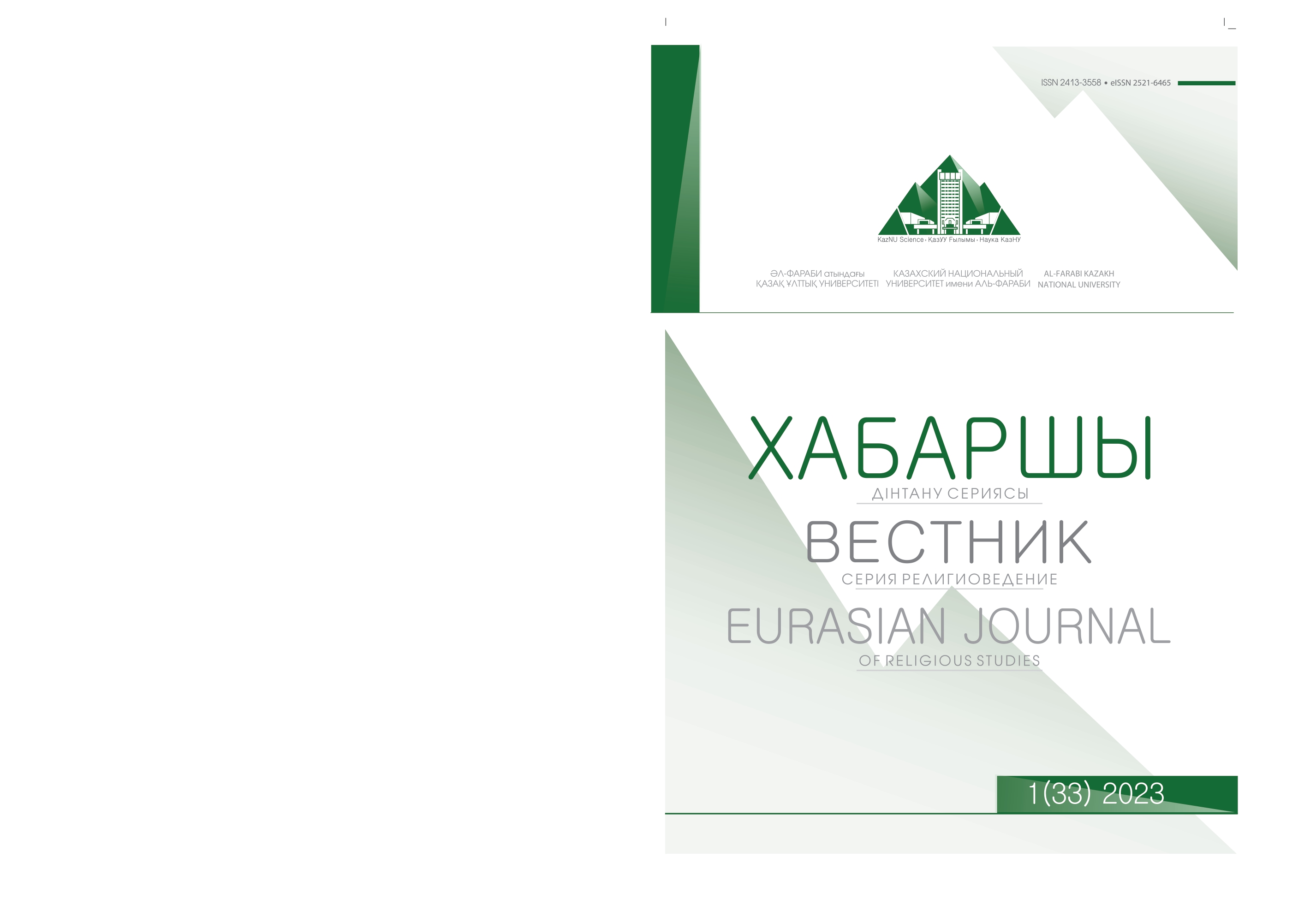Islamism, the main stages of development: religious discourse
DOI:
https://doi.org/10.26577//EJRS.2023.v33.i1.r1Abstract
This article examines various aspects of the discourse of political Islam. Based on a meaningful analysis, the continuity of the international political Islamic discourse is shown. The conclusions obtained during the study are related to the sharp revival of political Islam in the late twentieth and early twenty-first centuries. Complex and diversified Islamism and Islamists, while maintaining continuity, have undergone significant changes over time. This was revealed because of the analysis of the main stages of the development of Islamism. Modern Islamism is a relatively young political ideology of Islam. In recent decades, the development of Islamism has been closely linked with the revival of Islam and the modernization of Muslim countries. Islamism is often defined as «politicized Islam» or «political Islam». Researchers draw attention to the fact that it is impossible to put an equal sign between Islam and Islamism, between religion and the political ideology that arose on its basis. Such an understanding of Islamism does not give a complete picture of it, because Islamism is not only a political, but also a social ideology and a certain way of life. At the same time, this article will also pay enough attention to the stages of the development of Islamism.
Key words: Islamism, political Islam, discourse, society, state, continuity, Islamists.
References
Ланда, Р. Г., Саватеев, А. Д. (2015) Политический ислам в странах Северной Африки. Исламские радикальные движения на политической карте современного мира. Т. 1. Страны Северной и Северо-Восточной Африки. - М.: Ленанд. - 126–180.
Левин, З. И. (2014) Очерки природы исламизма. - М.: ИВ РАН. -126.
Мирский, Г. И. (2015) Радикальный исламизм: идейно-политическая мотивация и влияние на мировое мусульманское сообщество. Доклад Международного дискуссионного клуба «Валдай». - Москва, июль 2015. URL: https://ru.valdaiclub.com.
Царегородцева, И. А. (2017) Исламский активизм: основные этапы развития идеологии. Исламские радикальные движения на политической карте современного мира. Т. 2. Северный и Южный Кавказ. - М.: Ин-т Африки РАН. – 93-111.
Referenes
Achilov, D., & Sen, S. (2017) Got political Islam? Are politically moderate Muslims really different from radicals? International Political Science Review, 38(5), 608–624. https://doi.org/10.1177/0192512116641940
Grinin L., Korotayev A., Tausch A. (2019) Islamism, Arab Spring, and the Future of Democracy. World System and world Values Perspectives. New York: Springer International Publishing. - 364.
Hooper, I. (2015).CAIR Welcomes AP Stylebook Revision of Islamist. Council on American-Islamic Relations Press Release. Washington, DC: CAIR. URL: https://www.cair.com/press_releases/cair-welcomes-ap-stylebook-revision-of-islamist/
In El-Din Shahin, E. (ed.) (2015) The Oxford Encyclopedia of Islam and Politics. Oxford: Oxford Islamic Studies. URL: https://www.insightturkey.com/file/275/the-oxford-encyclopedia-of-islam-and-politics-2-volumes-spring-2015-vol17-no2
Khan, A. R. (2007) All-India Muhammadan Educational Conference and the Foundation of the All-India Muslim League. Journal of the Pakistan Historical Society 55(1/2): 65–83.
Landa, R. G., Savateev, A. D. (2015) Politicheskij islam v stranah Severnoj Afriki. Islamskie radikal'nye dvizheniya na politicheskoj karte sovremennogo mira. T. 1. Strany Severnoj i Severo-Vostochnoj Afriki [Political Islam in the countries of North Africa.Islamic radical movements on the political map of the modern world. Countries of North and Northeast Africa]. – Moscow: Lenand. - 126-180 (in russian).
Levin, Z. I. (2014) Ocherki prirody islamizma [Essays on the nature of Islamism]. – Moscow: IV RAS. – 126 (in russian).
Mirsky, G. I. (2015) Radikal'nyj islamizm: idejno-politicheskaya motivaciya i vliyanie na mirovoe musul'manskoe soobshchestvo. Doklad Mezhdunarodnogo diskussionnogo kluba «Valdaj» [Radical Islamism: Ideological and political motivation and influence on the world Muslim community]. – Moscow: Report of the Valdai International Discussion Club. - 52 (in russian).
Muddassir, Q. (2017) The Turkish Referendum. Contemporary Review of the Middle East 4(3): 319–327. DOI: 10.1177/2347798917711076
Mura, A. (2012) A Genealogical Inquiry into Early Islamism: the Discourse of Hasan al-Banna. Journal of Political Ideologies 17(1): 61–85.
Osman, T. (2016) Islamism: What it Means for the Middle East and the World. – New Haven, CT: Yale University Press. - 328.
Pipes, D. (1995) The Western Mind of Radical Islam. First Things December. URL: http://www.danielpipes.org/273/the-western-mind-of-radical-islam.
Reimer, M. (2005) Modern Egypt: the Formation of a Nation-State; Arthur Goldschmidt, Jr. Digest of Middle East Studies. 14. 87-91.
Sayyid, B. S. (1997) A Fundamental Fear: Eurocentrism and Emergence of Islamism. – London; New York, NY: Zed Books Ltd. - 212.
Tsaregorodtseva, I. A. (2017) Islamskij aktivizm: osnovnye etapy razvitiya ideologii. Islamskie radikal'nye dvizheniya na politicheskoj karte sovremennogo mira. T. 2. Severnyj i YUzhnyj Kavkaz [Islamic activism: the main stages of ideology development. Islamic radical movements on the political map of the modern world. North and South Caucasus]. – Moscow: Institute of Africa RAS. - 93-111 (in russian).
William E. Shepard; FranÇois Burgat; James Piscatori; Armando Salvatore (2009) "Islamism". In John L. Esposito (ed.). The Oxford Encyclopedia of the Islamic World. Oxford: Oxford University Press. ISBN 9780195305135.




